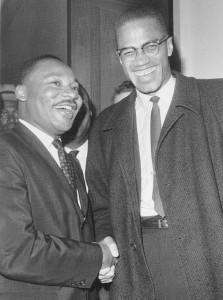Between Martin, Malcolm, and Modern
Oftentimes I find myself pondering who I would have faithfully followed during the turbulent Civil Rights Era. Would I have been a loyal supporter of Dr. King’s nonviolent resistance? Or would I have sided with brother Malcolm X in his militant approach to Black Nationalism?
I’ve never been much of a fighter or instigator, yet I cannot imagine sitting idle while racist policemen clubbed my dome, flushed me with fire hoses, and set angry German Shepherds on my tail. In this regard, I may have clung to Malcolm’s intimidating messages that struck fear in the hearts of the ruling majority. Still I’m conflicted when considering the religions of these Civil Rights heroes. Being a lifelong Christian, would I have felt obligated to stand behind the good Reverend Doctor? Or would I have converted to the mainstream, color-blind, Islam Malcolm discovered shortly before he was assassinated? Looking at my Arabic solar plexus tattoo in the mirror, I cannot be certain. Furthermore, as a college educated Black man, would I have been more inclined to listen to King, an Alpha Phi Alpha man like myself, or X who self educated himself in prison? My inclinations say MLK when considering this aspect, although I have a great appreciation for unconventional learning. Then, when I consider my New York upbringing, might I have adulated “Harlem’s Lion”, or would I have revered the preacher from the South where I’ve resided for the past decade? These are just a slither of the questions that come to mind when I analyze the lives of Dr. King and Malcolm X.
In any regard, the only relevant question to ask today is how do we take what we learned from Malcolm and Martin, enhance their agendas, and make their messages applicable in modern society? Well the first thing that comes to mind is political strength. With the endorsement of Martin Luther King Jr., President John F. Kennedy was able to garner the votes he needed to gain a narrow victory in the 1960 election. Malcolm X, while distrustful of the political “foxes and wolves” that comprise the Democratic and Republican parties, also referenced in his autobiography the power that 22 million voting African Americans possessed. He felt that if Black Americans all voted and lobbied as a cohesive unit in the same vein as farmers, union workers, etc then we would possess the strength to sway the political process in our favor. One of my favorite Malcolm X quotes is “we, the Black masses, don’t want these leaders who seek our support coming to us representing a certain political party. They must come to us today as Black Leaders representing the welfare of Black people.”
Us Negroes did a great job of turning out to vote for Barack Obama in November of 2008… No secret there. But imagine if we formed a coalition of voters that specifically lobbied for issues pertaining to the Black agenda; we would truly be able to sway the political pendulum in our favor. We outnumber the tobacco enthusiasts, the gun rights fanatics, the healthcare conspirators. Our combined spending power (projected to top 1.1 Trillion Dollars by 2012) also greatly surpasses those of all special interest groups. There is no reason that Black people should not have the most respected and influential voting block in American politics. We must come together, identify the top priority issues we would like to see addressed in our community, and fight like hell for the Federal Government to bend to our demands. The Black Lobby – that is how we can make Martin and Malcolm’s work relevant in the modern era.

 by
by 
Both these brothers were trying to uplift our people. Im with Malcolm because of his relsiliance although I am not a musilm I respect that perspective. Theres is no doubt that these leaders influenced this country. “They taught me to Make my DREAMS come true BY any means Neccesary!!!”
Good to see a new post brotha Walker.. keep em coming.
Peace
I always wonder the same thing. Whose position would I have backed. Being a New Yorker as well, and having that “fed up attitude” my natural inclination is to say malcolm (although I not Muslim). As i have matured in life i do feel Martins approach was a bit more effective. 2 points:
Point 1: These brothers Martin in particular fought for things specific. I.E not being able to vote, so like you said IDENTIFYING specific and prominent issues is extremely important.
Point 2: 50’s/60’s our people as a whole virtually went through the same struggles couldn’t vote, extreme physical racism, so the unification process was easier. Now we have so much division in social stratification it is hard to get any unity as a whole. Combined with the fact our people persist on breeding athletes instead of politicians.